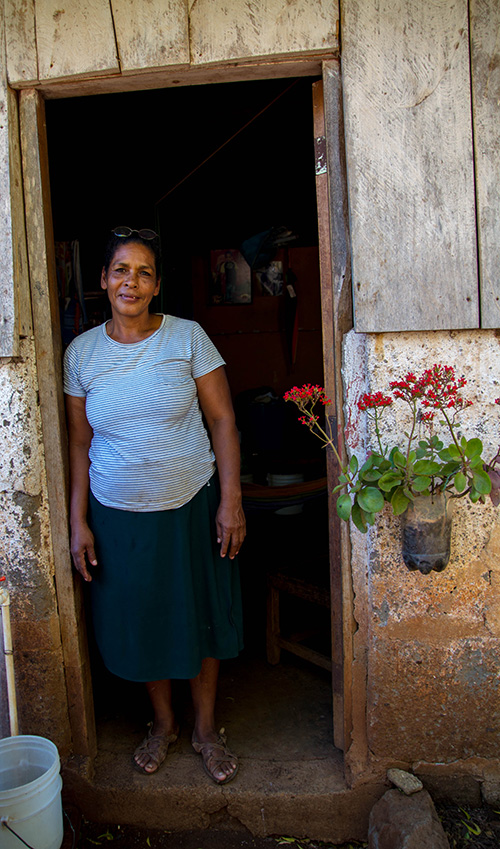Stories of Change

Ramona. Photo: Amber Blake / CWS
In a 1.5-year period, 221 community promoters accompanied 884 farmers as part of the CWS-supported program in Nicaragua.
Hope, despite the challenges of climate change
“Doña Ramona has been a natural and positive leader from the beginning. She is constantly encouraging others to take initiative and take advantage of learning opportunities despite the challenges posed by poverty and water scarcity,” says Maryan Guzman. Maryan is a member of local ecumenical NGO CIEETS, which is CWS’s implementing partner in La Conquista, Carazo department, Nicaragua. The area is part of Central America´s dry corridor, an area devastated by droughts in 2014 and 2015 and by a plague that destroyed part of the crops in 2016. In 2017, excess rainfall is taking a toll on crops.
Ramona Cruz tell us, “I have lived in the community of El Nance for 40 years now. My husband and I have worked a lot to make a living, and thanks to God we have overcame several crises. Unfortunately, the drought in recent years has been the worst. Since 2014, we haven’t had enough rainfall – not to harvest or even to recover the seeds we used. In order to survive, our family of eight – like most of our neighbors – had to sell almost all our chickens, pigs and ducks. Later, during the first planting season in 2016, a little rain came in but was late (mid-June). Despite this, there was little sowing – since the first sowings are made in the third week of May – but when some of the corn, beans and sorghum began to mature a plague killed the crops in this area. We produced enough to survive but not enough to sell. These years have weakened us greatly. Our oldest son who studied for a technical career had to drop vocational school for lack of financial aid.
“Our son is our right hand. He is always trying something new on our land with the CIEETS technician. He has created an irrigation system to harvest water in the summer; he found a way to transport water from the river to a height of 15 meters without an electric pump. People are amazed with it.
“My husband, son and I are volunteer promoters of the project and we like it! I am responsible for managing the community rain gauge. I measure and record rainfall, and when it is too heavy I alert neighbors so they do not cross the nearby river because it is too dangerous. The rains we are seeing so far in 2017 are stronger than previous years, it has rained a lot and some crops – especially maize and beans – are being lost because we used a variety of seed resistant to drought and now there is too much moisture in the soil.”
Ramona is proud to share that, “My husband is in charge of the management committee of the local seed bank, and my son supports us with training at the local Farmer Field School in El Nance.”
Agromomist Maryan explains that, “Each Community Seed Bank is key to ensure families access the seeds they need each planting season. Last year we strengthened them with drought-resistant maize and bean seeds”.
Maryan firmly believes that the project promotes initiatives that will improve the situation of families in El Nance in the medium and long run: groundwater recharge through community-led reforestation, rainwater catchment and storage systems, stronger community-based organizations and solidarity among neighbors through Farmer Field Schools and local faith leaders that participate more effectively in community awareness-raising and community mobilization efforts.
Ramona believes, “there are reasons to be hopeful.” Her family and the other 75 families living in the two nearby communities have seen positive change taking place in their own backyards and kitchens.
In the last two years 76 households have access to fresh and safe water in their homes thanks to an ambitious water project that takes and stores underground water in a community cistern and distributes it along 5.6 miles of pipes. Communities donated the land for the cistern, and the local water committee administers the system. The local government funded the digging of the 100 ft. well and the construction of the water cistern. With support from CWS and Foods Resource Bank, CIEETS provided the pipes and technical assistance needed to create and train the water committee members according to Nicaragua´s water legislation.
“Today, communities have access to safe water 12 months a year,” summarizes Maryan. “Before the water system, Ramona had a family well with contaminated water and had to fetch water from the nearby river, which also had contaminated water”.
Maryan ends by saying why he thinks Ramona is a role model: “She is always encouraging others, caring for the community and being thankful for what she has.”
